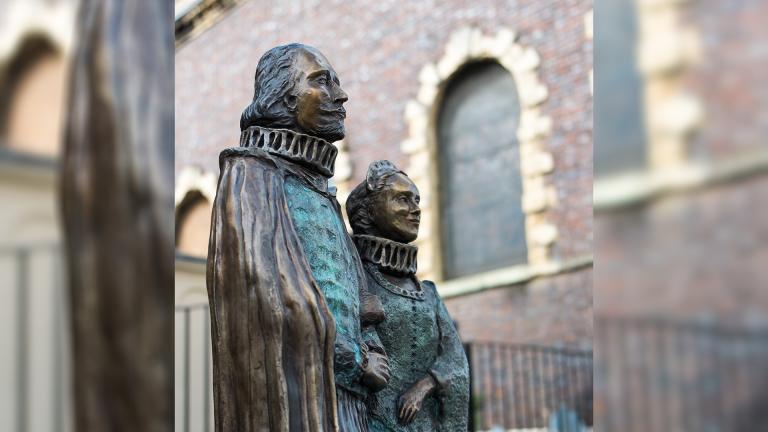
Read more about Tudor History

William Shakespeare needs no introduction. Today, he is arguably the world’s most acclaimed and influential dramatist, with no shortage of iconic plays having emanated from his quill.
The ubiquity of Shakespeare’s name has endured to the present day. Given this staying power, it is surprising how little is actually known about the personal life of the man himself. This even extends to the details of his decades-long marriage.
What do we know about Shakespeare’s wife, Anne Hathaway? Did she influence her husband’s literary output? Does the upcoming drama film Hamnet depict the title character’s mother in a historically accurate light? Sky HISTORY investigates…
Of course, as we all know, Shakespeare was born in Stratford-upon-Avon, which, today, is a popular tourist attraction as a result. Slightly less clear is when he was born. 23rd April 1564 has often been chosen as a placeholder date, since the baby William is known to have been baptised three days later.
Anne’s birthdate is an even bigger mystery. It was at some point in 1556, meaning she would have been in her mid-twenties upon her marriage to Shakespeare in 1582. The bridegroom, meanwhile, was just 18.
This large age gap has set some historians’ alarm bells ringing - especially as Anne was already pregnant by Shakespeare at the time of their wedding.
'All the world’s a stage, and all the men and women, merely Players,' one character famously declares in Shakespeare’s pastoral comedy As You Like It. Could it be that, before his marriage, Shakespeare had been a player in the - ahem - more modern sense of the word?
In other words, had Shakespeare carelessly impregnated Anne and consequently been coerced into hastily marrying her to save her family from scandal?
As recorded by the Bishop of Worcester, a wedding licence was issued to Shakespeare and an ‘Anne Whateley’ in 1582. Just one day later, two friends of the Hathaways agreed to act as financial guarantors for William’s wedding to Anne Hathaway. So, had ‘Whateley’ been William’s original beloved?
No, Shakespeare probably didn’t have to tear up any wedding plans due to fumbling about with another woman. It is now generally thought that the two Annes are actually the same person, and the mention of ‘Whateley’ was simply a clerical error.
The seemingly rushed, impromptu nature of the wedding has still fuelled speculation that it was somewhat forced upon the young William. Some biographers have even suggested that the experience led Shakespeare to harbour a deep-seated resentment towards his wife.
It’s impossible to tell for certain, as very few documents from the time even mention Anne. We know that, with her husband, she had three children — Susanna in 1583 followed by boy-and-girl twins Hamnet and Judith in 1585.
By the early 1590s, Shakespeare had cemented his presence on the London theatre scene. Shakespeare subsequently spent much of his life lodging in London. Was this purely for work-related reasons, or at least partially an attempt to keep his wife at arm’s length?
For many years, the latter interpretation has held a lot of sway among scholars. However, its credibility has recently been thrown into doubt by a note now thought likely to have been penned by Anne herself.
A 17th-century letter addressed to 'good Mrs Shakespeare' asks her for money her husband supposedly owed an orphan boy named John Butts. On the other side of the paper is what looks like a reply to the letter, where its recipient spurns the request.
A close look at historical records suggests that this reply was genuinely Anne’s. The letter also mentions Shakespeare residing in central London’s Trinity Lane area.
University of Bristol academic Professor Matthew Steggle remarks that the letter 'seems to show her being involved with her husband’s money affairs and social networks.' So, the couple apparently not only cohabited in the English capital but also enjoyed a close, affectionate bond there.
There have been many cultural depictions of Anne — including in Maggie O’Farrell’s 2020 novel Hamnet, where she is referred to as Agnes. In real life, this is the name used in her father’s will. The new film Hamnet is adapted from the novel, with Jessie Buckley starring as Agnes.
Keen to explore more of the Elizabethan and Jacobean circles the Shakespeares occupied? Just sign up to the Sky HISTORY Newsletter for timely updates about future documentaries bound to pique your interest.